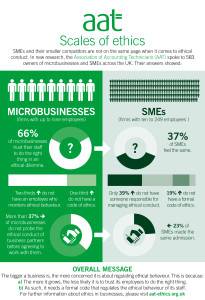May 20, 2014
Trust in ethical behaviour is linked to the size of the business, claims report
 The larger the firm the less likely it is to trust its employees to behave ethically according to a new report from the Association of Accounting Technicians. The research also found that UK’s most ethical businesses are small architectural practices. According to the research, conducted by Opinion Matters on behalf of AAT, only 37 per cent of SMEs trust their staff to do the right thing compared to 66 per cent of microbusinesses. The report also found that firms in the architectural sector have more faith in the ethical decision making of their employees and are more concerned about the ethical behaviour of suppliers than in any other industry. Interestingly, the report highlights the fact that, as the number of employees increases, businesses are more likely to dedicate a member of staff dedicated to fostering ethical behaviour and have a formal code of conduct.
The larger the firm the less likely it is to trust its employees to behave ethically according to a new report from the Association of Accounting Technicians. The research also found that UK’s most ethical businesses are small architectural practices. According to the research, conducted by Opinion Matters on behalf of AAT, only 37 per cent of SMEs trust their staff to do the right thing compared to 66 per cent of microbusinesses. The report also found that firms in the architectural sector have more faith in the ethical decision making of their employees and are more concerned about the ethical behaviour of suppliers than in any other industry. Interestingly, the report highlights the fact that, as the number of employees increases, businesses are more likely to dedicate a member of staff dedicated to fostering ethical behaviour and have a formal code of conduct.
Nearly two thirds of microbusinesses do not have someone looking after ethical behaviour, and one third of these types of businesses do not have a code of ethics. The scenario is different when the report looks at SMEs with only 19 per cent admitting to not having a business code of ethics and 39 per cent do not have someone responsible for looking after ethical conduct.
 When asked whether business owners consider the ethical behaviour of their suppliers before agreeing to work with them, more than 37 per cent of microbusinesses do not look into this aspect whereas only 23 per cent of SMEs do not take this into account.
When asked whether business owners consider the ethical behaviour of their suppliers before agreeing to work with them, more than 37 per cent of microbusinesses do not look into this aspect whereas only 23 per cent of SMEs do not take this into account.
Director of the Institute of Business Ethics, Philippa Foster Back, said: “Due to requirements of prime contractors higher up supply chains, smaller firms are increasingly asked during tendering processes about their ethical risk management. The ethics of a small organisation is typically influenced by the owner-manager as their behaviour will set the tone of the business and any values and ethical principles will usually be implicit. However, there are advantages to having a more formal ethics policy in place. Firstly, it reinforces and makes explicit the values and principles that are part of the organisational culture, so allowing them to be communicated to stakeholders. Secondly, a policy will provide guidance and support to employees on how they are expected to conduct their business.”
Commenting on the research, Adam Harper, Director of Professional Development of AAT said: “In the finance and accounting sector, we are well aware of the importance of ethics in business and the role it plays. New clients are likely to be drawn to work with organisations that demonstrate their integrity, so we take the view that ethical companies are sustainable companies. It’s also important for microbusinesses and small businesses to examine their supply chains and to ensure that the people they are doing business with also act ethically to protect brand reputation but also to ensure fair play within industry sectors. A business supply chain is as much a reflection on their organisation as their employees are.”
Over 1,000 small business owners were contacted across various sectors and asked if they believe that they act ethically for a survey conducted on behalf of the Association of Accounting Technicians (AAT). More than 90 per cent of architecture businesses said that they “always act ethically”, compared to 31 per cent in manufacturing and 25 per cent in information technology. Architects were also more likely to consider the ethical behaviour of their suppliers than any other industry, with over 80 per cent of architecture respondents claiming to think about this before agreeing to work with other businesses.
“In the finance and accounting sector, we are well aware of the importance of ethics in business and the role it plays,” said Adam Harper. “New clients are likely to be drawn to work with organisations that demonstrate their integrity, so we take the view that ethical companies are sustainable companies. It’s also important for small businesses to examine their supply chains and to ensure that the people they are doing business with also act ethically to protect brand reputation but also to ensure fair play within industry sectors. A businesses supply chain is as much a reflection on their organisation as their employees are.”
____________
Image by Zazzle













